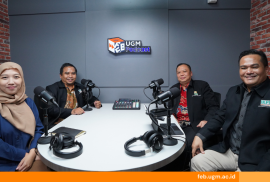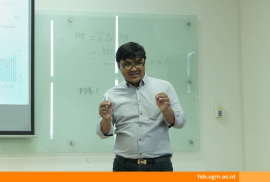The COVID-19 pandemic has had a far-reaching and profound impact on the economy and business. Economists take various approaches to analyze the trade-offs of the pandemic on the economy, as well as appropriate monetary, fiscal, and other regulatory policies in order to stop the chain of infection and restore the global economy. In response to this, on Wednesday (6/7) International Week (iWeek) held a lecture on economic-epidemiology in order to view the epidemiological model with the integration of economic theory. This lecture was presented by Dr. Jude Bayham, a lecturer at Colorado State University. Dr. Jude started the lecture with an overview of cases of COVID-19 infection and death in Indonesia compared to neighboring countries. Jude Bayham discussed three main topics of the lecture, namely: the role of human behavior in modeling and studying pandemics, measuring the estimated effects of policies during a global pandemic, and the false dichotomy of public health vs. economy.
Then, Jude explained the concept of economic-epidemiology, which according to Fenichel (2011; 2013) is defined as an attempt to integrate economic theory into the epidemiological model of infectious diseases. This is made possible by modeling the global community as an economic actor with decisions that affect the spread of infectious disease, in this case COVID-19. In measuring the effect of policies during the global pandemic, Jude looked at the United States (US) government’s policy regarding the mask mandate which was monitored by The Centers for Disease Control and Prevention (CDC). In an analysis of the mask mandate in the fall of New Mexico, hospitalization rates after the introduction of mandatory masks declined. However, the reduction in hospitalization rates did not last long. This shows that the mask mandate cannot be concluded as the right policy.
In another analysis regarding government policy, Jude juxtaposes the chart index of hospitalization rates with charts of consumer spending in Colorado. The government’s lockdown policy aims to avoid excess hospital occupancy capacity. Research shows that this policy was successful in curbing hospital occupancy rates but at the same time also caused an economic depression, marked by a decline in consumer spending, business income, and employment levels. In terms of education, Jude researched, using forecasting and compared observing methods, regarding the Colorado government’s policy to allocate federal grants funds to areas most affected by COVID-19.
On the last point, to prove the false dilemma of public health vs. economics, Jude refers to the main findings of Chetty et al. (2020), that “In the long-term, the only way to drive economic recovery is to invest in public health efforts that will restore consumer confidence”. Then, Jude presented his three main conclusions, the first is that human behavior has an important role in modeling and studying pandemics. Second, estimating the effects of policies during a pandemic is essential but difficult to do. Third, is that public health vs. economic activity can be concluded as a false dichotomy. In the end, this iWeek lecture ended with a question and answer session which the participants responded enthusiastically.
Reportage: Hayfaza Nayottama
Watch the full video: https://youtu.be/uQJsxNr7RQk




